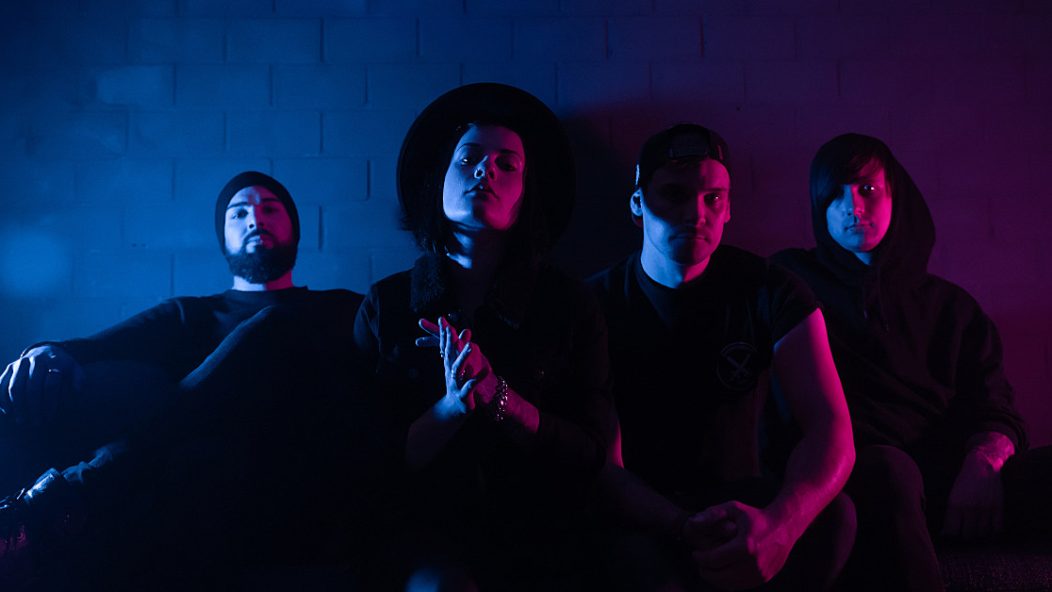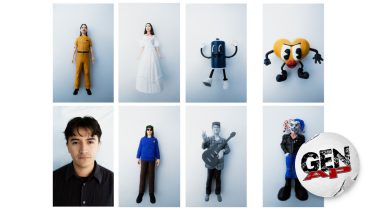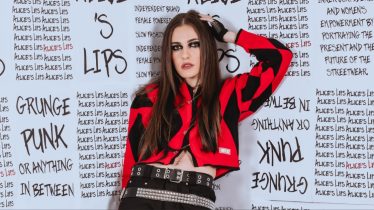
SETYØURSAILS' Jules Mitch on fusing metal and melody on 'Nightfall'
SETYØURSAILS have released their new album Nightfall via Napalm Records. Coming from Cologne, Germany, SETYØURSAILS have crafted a unique sound that synthesizes elements of hardcore, old school metal, melodic rock and more. Drawing from across the rock spectrum, lead singer Jules Mitch cites a wide range of artists from Paramore to Korn as musical influences. The end result is a surprisingly harmonious sound, one that melds hard-hitting rock energy with soaring melodic choruses. It’s made for anyone who still holds the early years of metalcore in their hearts but still yearns for the genre to keep evolving into everything it could be.
Read more: Snail Mail defied fears of the sophomore slump to make “Valentine”
Ahead of Nightfall, Mitch spoke to Alternative Press about the band’s journey. During the conversation, Mitch chronicled a path that was equal parts personal and musical. During the process, she and her bandmates found a unique combination of courage and honesty that led them to push stylistic envelopes and craft songs that refuse to shy away from difficult topics. Mitch also challenged herself as a vocalist, creating songs that required quickly switching from guttural screams to powerfully driven clean vocals. The end result is Nightfall. Engaging a wide range of themes, from personal depression to social issues in Germany (and across the world), the record is as lyrically deep as it is musically compelling.
What were your goals for this album? What were you trying to say musically?
I would say the new record turn out to be very personal, and I always used to call the writing sessions therapy sessions because that’s really what it was. I learned a lot about myself in this writing process, and I learned to open up and be honest about myself and being honest about the diseases I face, such as depression. It almost feels like it’s my diary, and that’s actually a little scary to release it, but also feels very, very good. We’re really proud of it because we’ve been working on it for about two years. I would say it’s a very dark record, but also [a] very honest record.
It also feels like you’ve really developed since your first record, 2018’s Enough. That record has a very raw hardcore sound, but also a very minimalist approach to songwriting. How did you develop leading up to this new project?
The first record was basically just releasing demos because we just wanted to play. So the only chance for us was to release music ourselves. We just threw it out there. We only knew each other for half a year when we sat together for the first time songwriting. It’s a different situation knowing each other for only half a year or knowing each other for five years. As I already said, it was difficult for me to open up, even for myself, but in front of other people.
First of all, I wrote it, and then I gave it to the guys, and the guys listened to it, and they were like, “Man, we had no clue it’s that bad or that you’re facing that.” They also said, “If you don’t want to release it, we don’t have to release if it’s too personal. You don’t have to do it.” It’s definitely different when it comes to songwriting because now we try so, so many different things that we weren’t brave enough to do in the first record.
There’s songs that I wrote completely myself instrumentally, and then there are songs Andre [Alves], our guitarist, wrote completely himself instrumentally. There are songs that we both wrote. This process was very different because we just sat together passing the guitar to one another shredding it and then just “whatever it sounds good.” This time, we took our time. We sat together with two producers and worked it out. So it was a very different process.
An effect of this process is that your sound has really opened up. One of the things that really jumped out to me about Nightfall is the depth of your songs. I can see it at a number of levels. There’s a lot of contrast between the songs across the whole album. Also, there are a lot of different styles represented.
I would say we became braver to try out other things. Now we’re using synthesizers and stuff like that, and we do have different influences. Influences come from Paramore to Korn. There’s such a big diversity when it comes to the sound. But we never actually sat down thinking, “Oh, we want to sound like that.” We just naturally started writing songs. We were even curious if these songs, at the end of the day, will actually sit together as a whole and will sound as an album.
As I said before, there’s songs that I wrote one-and-a-half years [ago] here in my bedroom. Then there’s songs that we wrote together with a completely different mindset. I would say it came naturally, but it also came with being brave enough to try out new things and, of course, the influences of the producers as well, which we didn’t have in the first record.
There’s also a lot of intricate architecture within the songs. There are huge contrasts within songs. It creates a lot of emotional richness.
That’s coming from Andre. He is always saying himself that he’s very bad at writing choruses. This is where I feel most comfortable. He’s listening to bands like Iron Maiden and stuff like that. He really likes the real shit, the real metal shit. We find a compromise, mixing our two styles together. We really tried to make it possible to fit the style of both of us into the songs. It turned out to be our style to have these shredding verses, and then the chorus opens up, and it’s very melodic and almost poppy. Andre starts writing songs, and then I’m like, “Oh, I would love to have a poppy chorus is in it, so let me write the chorus.” Somehow it fits together. Sometimes it feels like we have five different genres in our music, which is not a bad thing. We honestly don’t think in boxes. We don’t think, “Oh, we can’t use synthesizers, this is too….” If we like it, we add it. I feel like you can really hear that.
The other thing I wonder about is how that diverse sound impacts you as a singer. You have this amazing spectrum of sounds you create as a vocalist, ranging from really melodic clean vocals to powerful screaming.
That’s actually very tough, and I didn’t realize it when we were writing music. I realized that when we started practicing it because I was like, “Man, these are three different styles: clean vocals, there’s a little distortion to it in between, and then there were some very loud shouting parts. Switching between those is even physically very challenging and very hard. That’s why I took a couple of vocal lessons because you can really hurt your vocal cords, too. I started warming up correctly, cooling down afterwards and trying to sing without actually being hurt by the end of the rehearsal. So it’s very challenging. But when you’re performing these songs, they transport these emotions, and it fits. If you’re into the song, you don’t really think about it.
So do you channel your emotions to get through it, kind of let them take control?
I mean, if I would do it 100%, I would really hurt my vocal cords because I get very into it and sometimes get very aggressive. It’s a lot of training, a lot of practicing to actually get to the point where you don’t hurt your vocal cords because it’s very challenging, mentally as well as physically. I got into shouting. I actually listened to this to “The Lines” from Beartooth. This guy, he was switching from clean vocals to shouting. I was like, “What is that? This is insane.” That’s how I got into shouting. For clean, definitely Paramore. It just came naturally. I have a lot of anger in me, and it needs to get out. It fits the music style.
How does that translate to actually performing the songs? What’s it like prepping to go out on the road?
It got easier. I mean, if you perform them for the first time, you just perform in the studio. It’s a completely different thing. I’m a very active singer. I love to run around and jump and hit the guys or stuff like that. It’s definitely challenging, but I can do it. I will definitely need – we all need to practice. Before we go on tour, we also go in the fitness studio and stop eating cake and stuff like that. [Laughs.]
I also wanted to ask about your videos for “Ghosts” and “Mirror.” Both of them have this really great simplicity, which highlights you as performers.
We wanted to keep it simple because we just want to have the focus on the music. That’s why we chose to make them into performance videos. “Ghosts” was shot in a lost place in East Germany. It needed to have an atmosphere, 100%, but we really didn’t want to have a story. That was the first single. We want to have to focus on the band, on the music. “Mirror” was actually shot in a location next to our rehearsal room. Our video guy came up with this idea to make it look like it was shot in a music hall. Also very simple. Actually, it’s just a lot of switches from camera perspectives. There will be two more videos, and they’re going to be a little different. They’re not going totally crazy because it doesn’t fit. We want to keep it as authentic as possible. And we’re not big actors or stuff like that. We’re a live band, and we just want to play.
Another thing about your band that is really interesting is how politically outspoken you are. Why do you want to use your platform to discuss those kinds of topics?
Because it’s important. We live in Germany, and I can tell you there’s a lot of idiots living here. There’s a party in Germany called Alternative For Germany. They’re not even worth talking about, but we dedicated “Fckoff” to them. You walk on a street, and you see all these idiots standing up for completely stupid shit. You’re thinking, “Man, we could have such a good life together.” Everyone would just respect each other and just share some love and positivity instead of hating everything that’s different. What is different even mean? It all doesn’t make sense. It is what we’re thinking, and it is what we are believing in.
Hatred is the worst thing that we have in the world, and why not talk about it? If no one is talking about it, then how are people going to start being brave enough to stand up? We believe, especially living in Germany, it’s very important to not keep your mouth shut but to speak out. It’s something that we’re facing almost on a daily basis. It is in our minds all the time. As I already said, it’s a very honest record. It was one of the topics besides talking about my struggle with depression, having to deal with all these idiots here. We thought “Fckoff” is the right name for that. [Laughs.]
It’s interesting. The U.S. is obviously very politically divided, and we also have a surging right wing. But Germany and a number of other European countries are seeing some really intense developments. It’s been great to see so many artists standing up on those issues.
Maybe it’s because my grandparents had to face war. My grandfather actually was a prisoner in World War II. We heard these stories from the first-person perspective. We know how things can get worse. So it’s very important to stand up. Actually, if you talk to people, they will tell you that this is exactly how everything started. Now is the right time to speak up, and we’re not keeping our mouths shut because this is not right.
It’s really great to see such a strong message, emotionally and politically. Ultimately, I’m wondering if you have any overarching goals for this album.
I just really want to say that I hope that at least one person can relate to the lyrics or identify with the lyrics. This is what’s most important to me. I’ve opened up myself. For this record, it was very, very honestly written. I really hope that at least one person can identify themselves with it. This is my wish actually for the record.









